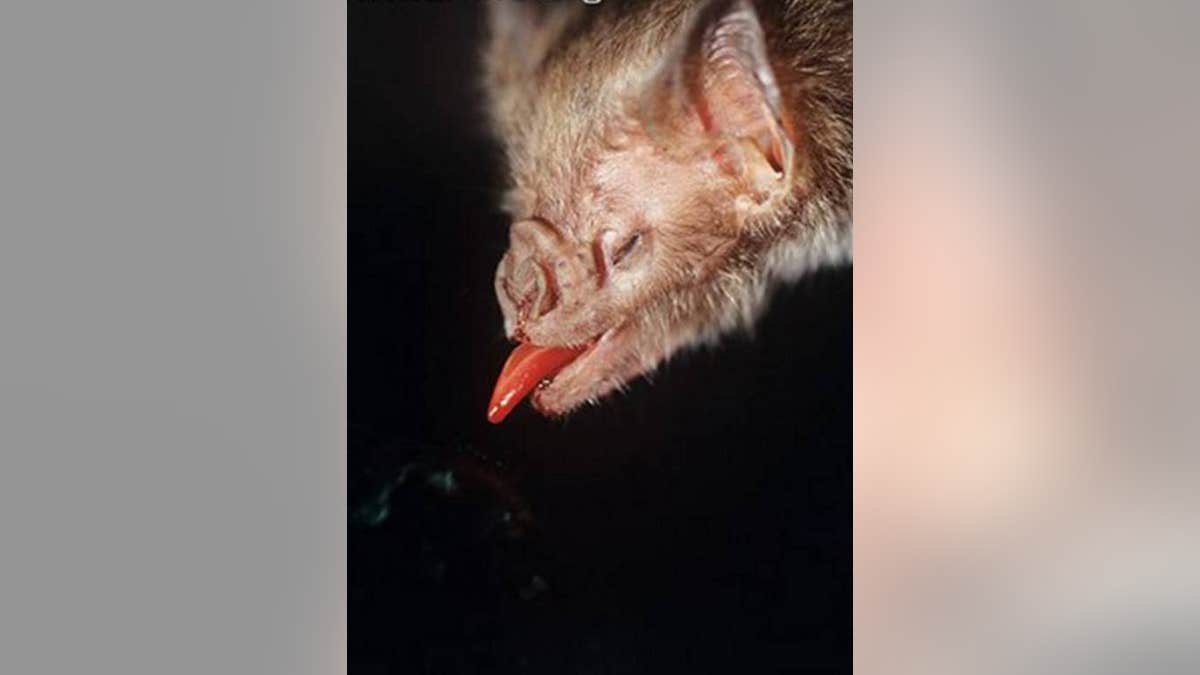
A vampire bat extends its tongue. New research finds that these bats have limited taste reception, even for potentially dangerous bitter flavors. (© Nick Gordon/www.ardea.com)
Vampire bats apparently don't have much use for a delicate palate. A new study finds these blood feeders can hardly detect bitter tastes.
Researchers already knew that vampire bats wouldn't make great foodies. They can't taste sweet or umami, the sort of savory flavor that makes broths and meats taste good. But the fact that these bats aren't sensitive to bitter is surprising, because bitter tastes often signal poison. As such, most animals are sensitive to bitter tastes (The only known exception among mammals is the bottlenose dolphin, which swallows its food whole anyway). But vampire bats are different, said study researcher Huabin Zhao, a zoologist at Wuhan University in China.
"Vampire bats are obligate feeders on blood, a food type [that] is unlikely ever to be bitter or toxic to these animals," Zhao told Live Science in an email. "The highly specialized diet with extremely narrow components would results in [a] remarkable reduction of bitter taste function in vampire bats, which would never encounter toxic foods in nature." [Tip of the Tongue: 7 (Other) Flavors Humans May Taste]
They want to suck your blood
Three species of bat consume blood, blood and only blood. They are the common vampire bat (Desmodus rotundus), the hairy-legged vampire bat (Diphylla ecaudata) and the white-winged vampire bat (Diaemus youngi). To eat, these South and Central American bats use echolocation to find prey. They then bite, making a small wound, and lap up the blood. Anticoagulants in the bats' saliva prevent the blood from clotting.
The common vampire bat sometimes feeds on humans, but their most common victims are livestock and birds. As the only mammals that feed exclusively on blood, the bats have attracted the interest of scientists, Zhao said. His previous work confirmed that vampire bats don't taste sweet and umami, but the ability to taste bitter was thought to be more crucial, he said.
Early behavioral tests suggested the bats had no aversion to bitter tastes. Next, the researchers turned to their main interest: a genetic analysis of the genes that enable the taste buds to sense bitter foods. They analyzed the genomes of all three vampire bats and 11 nonvampire bats, both close and near relatives of the bloodsuckers.
Lost genes
The analysis revealed that vampire bats do still have genes that enable the animal to taste bitter things. But many of these genes are so-called pseudogenes, or genes that are damaged or mutated so that they are no longer functional. In other words, vampire bats once had the ability to sense bitter tastes, but they have lost much of that sensitivity.
"Vampire bats reduced their bitter-taste [ability] very recently, because they still carry some functional bitter-taste receptor genes," Zhao said. "This finding suggests thatthe ancestors of vampire bats did not feed on blood originally, and the specific dietary changes may have arisen very recently."
The researchers now plan a closer examination of the intact bitter-taste genes as a way to understand how the ability to taste bitter things evolved. They reported their findings today (June 24) in the journal Proceedings of the Royal Society B.








































